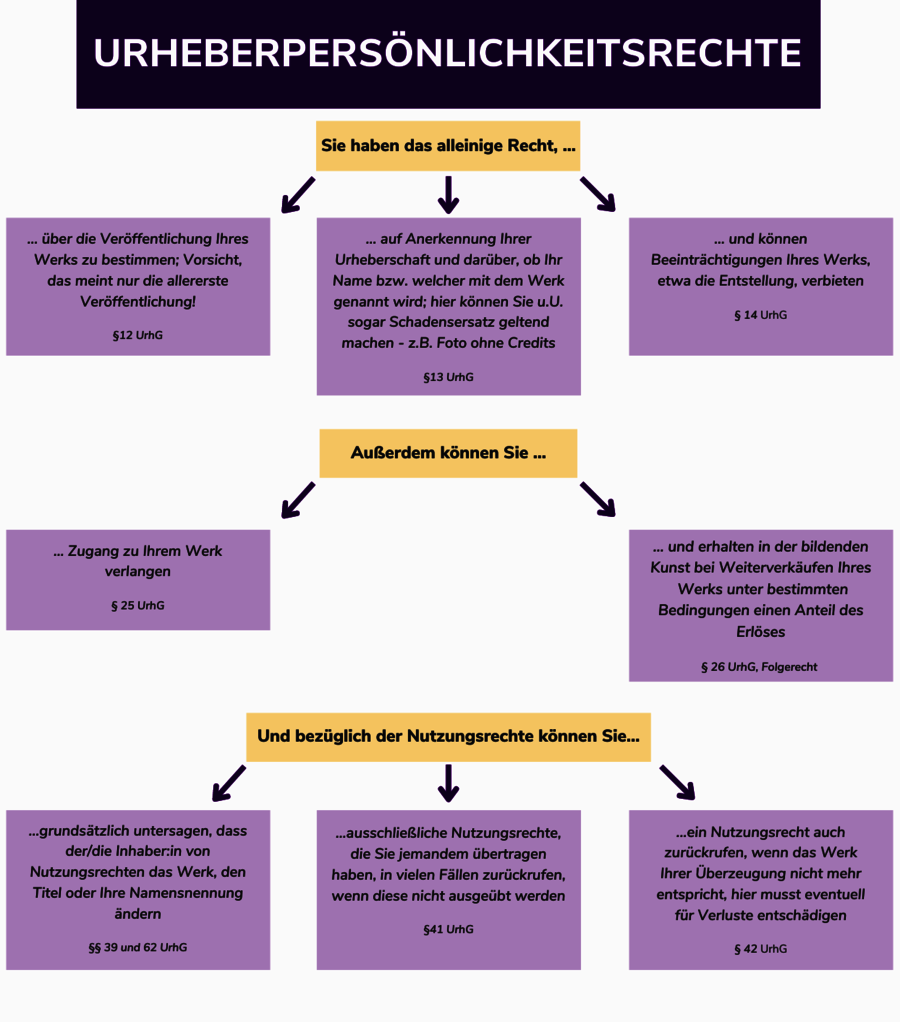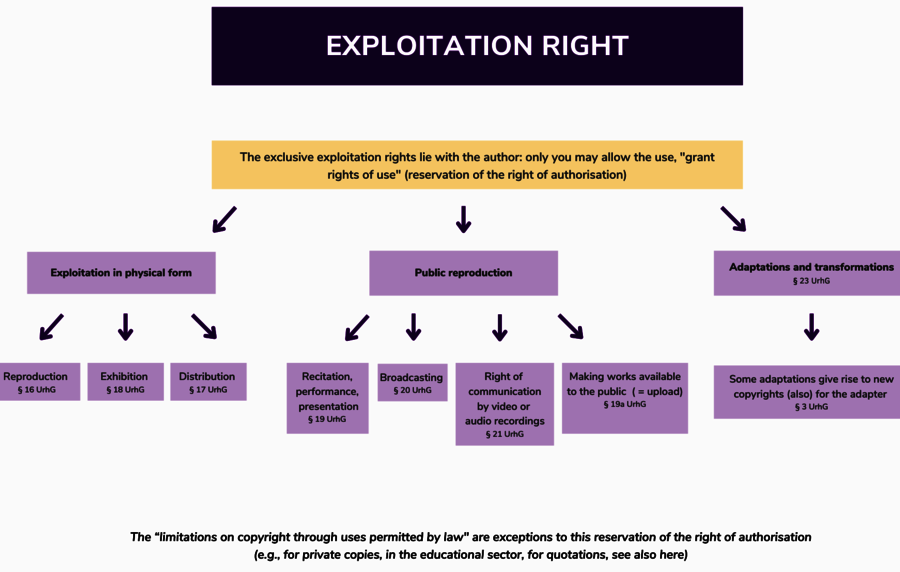Rights of authors
What rights do authors have in Germany?
Copyright law in Germany is essentially regulated by the Act on Copyright and Related Rights (German Copyright Act, UrhG), which distinguishes between the moral rights and material/exploitation rights of the author.
Section 11 German Copyright Act states the following: "Copyright protects the author in his or her intellectual and personal relationships to the work and in respect of the use of the work. It also serves to ensure equitable remuneration for the use of the work."
Unlike in other countries, the legal situation in Germany does not allow the transfer of copyright as a whole nor of individual exploitation rights because of the rights’ direct connection with the personality of the originator. Only individual usage rights may be granted.
The work
In order for a work to merit copyright protection, it must meet a certain threshold of originality (only available in German). Works protected by copyright must be "the author's own intellectual creations". The standards for protection are not always particularly high, however, since even works of minimal creative value (only available in German) may be protected (e.g. in music). The German Copyright Act lists the following: literary works, musical works, pantomimic works, including works in the field of dance, artistic works including works in the fields of visual and applied arts, photographic works, cinematographic works, and illustrations of a scientific or technical nature.
In many countries, it is generally not necessary to register the work to ensure it is protected. However, only the concrete form of a work is protected, not, for example, the mere idea behind it. When using the works of others, artists should, as a precaution, always initially assume that the work in question is protected by copyright, unless the term of protection has already expired and the work is in the public domain. The term of protection for copyrighted works is 70 years after the death of the longest-living author.
Exploitation rights and transferring rights of use
The creator of a work has the exclusive right to exploit the work in material and non-material form (Exploitation rights, Section 15ff German Copyright Act). If the work in question has been created by several co-authors, the exploitation rights can only be exercised jointly. You can find more detailed information about exploitation rights here.
Exploitation rights are not fully transferable in Germany. However, the author can grant third parties rights of use, also called licenses. A right of use may be granted as a non-exclusive right or as an exclusive right, and may be limited in respect of place, time or content. You can find more information about granting rights of use here.
In addition, there are limitations on copyright, which legally permit certain uses of works in the interest of the general public (e.g. right of quotation or right to make private copies). This means that, as a rule, no individual permission for use must be obtained in these cases. Nevertheless, such use may be subject to payment in many cases – either by the users themselves or in the form of fixed amounts, which are sometimes included in the retail prices. Collecting societies in Germany administer these funds and distribute the money to the rights holders and authors who have concluded collecting agreements with them.
When purchasing a music CD or a painting, the buyer receives the right to use the music or painting in a private setting, but no further rights are transferred automatically. The music may not simply be redistributed or the painting reproduced on the owner's website. An additional agreement is required to grant the corresponding rights.
You can find information on the exceptions pertaining to the right of exhibition here.
Exploitation rights
Exploitation rights are of varying importance for the different sectors. This graphic shows which exploitation rights are specified in detail in the German Copyright Act:
A visual artist creates works in the context of a residency grant in Germany, one of which remains the property of the hosting institution as per the agreement with the institution. What does this mean in terms of copyright?
Under German law, the institution would only become the owner of the work – when in doubt, rights are granted only for use within the context of the institution and for exhibitions (rights of use). Even using the work for advertising purposes in a brochure published by the institution is not permitted without the artist's consent. The copyright – moral rights and exclusive exploitation rights – remains with the artist.
Exclusive and non-exclusive rights of use
The author may grant users exclusive or non-exclusive rights to their work.
A non-exclusive right of use means that others may still be granted the right to use the work. The non-exclusive transfer of rights of use is common in the case of events and in the field of stage craft, for example.
A playwright grants a company the non-exclusive right of use for the performance of his play. He may also continue to grant this right to other theatres.
Granting an exclusive right of use, on the other hand, excludes all others, including the author themselves, from using the work. If the author wishes to use the work, they must reserve this right when granting the license or have it granted again later.
Rights of use may be granted for all exploitation rights or for selected rights only, i.e. rights of use that are limited in terms of content. Alternatively, types of use may be split. For example, one licensee may be granted the exclusive reproduction right for physical sound storage media, while another licensee may be granted the exclusive right for downloads.
It is also possible to limit the rights of use or their transfer in respect of place. For example, in the case of stage and publishing rights, it is often customary to grant a different book or theatre publisher in each country the exclusive rights of use to the work.
A playwright grants rights to her work for a performance in the USA. In case of doubt, the rights have not been granted for Europe.
A US publisher has granted the ancillary rights for a European tour. Now part of the text is to be translated into German and performed. Additional rights are needed when producing a translation, i.e. editing rights to carry out and use the translation. If there is already a German version of the work, the rights will most likely be held by a German publisher, who in turn would have to be asked to grant new performance rights, this time for the German adaptation.
Rights of use may also be granted for a limited or an unlimited period of time.
It is customary not to grant performance rights for stage works to several theatres in one city at the same time. For example, a theatre may be granted an exclusive right for a specific season, after which the right is converted into a non-exclusive right of use or the right of use expires.
Licensing agreements, transfer of rights for a specific purpose and employment, new types of use
The rights granted are determined by the licensing agreements between authors and users. Licensing agreements should always be formulated as precisely as possible. Unless the individual rights are explicitly named, the underlying purpose of the agreement determines the types of use covered by the agreement (Section 31 (5) German Copyright Act, transfer of rights for a specific purpose). This also applies to the matter of whether the right in question is a non-exclusive or exclusive right of use and the limitations in respect of time and place to which the use is subject, for example (see also Model contracts).
These provisions also apply "where the author has created the work in the fulfilment of obligations resulting from an employment or service relationship, unless otherwise provided in accordance with the terms or nature of the employment or service relationship." (Section 43 German Copyright Act). This means that there is no "work for hire" in Germany, as there is in the USA, for example, where all copyrights – moral rights and rights of use – can be transferred from the author to the client. However, it is unfortunately very common, especially in the area of ancillary copyright, for contracts to provide for the exclusive granting of all rights of use in return for a one-off payment (also known as "buy outs”). As of 2017, the law states the following in this regard: "Flat-rate remuneration must guarantee the author's equitable participation in the expected total proceeds from such use and must be justified in the light of sector-related specificities" (Section 32 German Copyright Act). Furthermore, in the case of flat-rate remuneration, exclusive use is usually initially limited to a period of 10 years (Section 40a German Copyright Act).
Another challenge that arises is when new types of use emerge and the author and user must agree on the corresponding use and conditions. In principle, the granting of licenses for types of use that are still unknown when the contract is concluded has been possible since 2008, but this requires a written agreement (Section 31a German Copyright Act). In addition, the user must inform the artist in writing three months prior to the commencement of a new type of use, during which time the artist may revoke their consent to this new type of use. Furthermore, the artist is entitled to equitable remuneration for the new type of use. This provision also applies retroactively, with minor deviations, to contracts concluded between 1966 and 2008 (Section 137l German Copyright Act).
Documents
Collecting agreement, GVL
Collecting agreement BG I+II, VG Bild-Kunst (German)
Collecting agreement BG III, VG Bild-Kunst (German)

